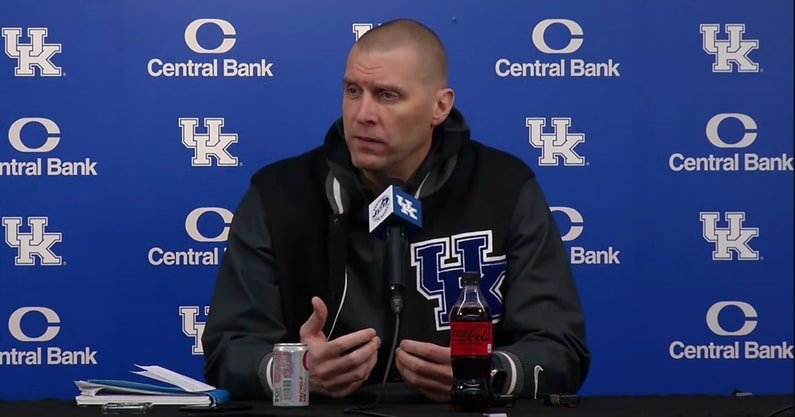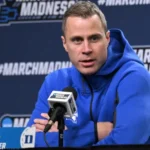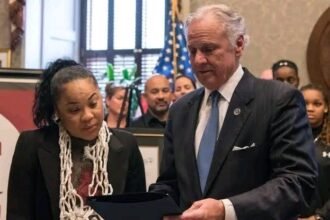Breaking News: Kentucky Wildcats Basketball Coach Mark Pope Rushed to the Hospital After Suffering Heart Failure
The college basketball world was thrust into a state of shock and concern Thursday afternoon as Kentucky Wildcats head coach Mark Pope was urgently transported to the University of Kentucky Albert B. Chandler Hospital following a sudden cardiac emergency. The 51-year-old coach, who was hired in April 2024 to revitalize the Wildcats’ storied program, collapsed during a routine preseason practice at the Joe Craft Center, sending players, staff, and medical personnel scrambling to administer life-saving aid. Eyewitnesses described a chaotic scene as Pope, midway through a drill focused on offensive sets, clutched his chest and fell to the court, prompting an immediate 911 call. Paramedics arrived within minutes and performed emergency interventions before rushing him to the hospital, where he remains in critical but stable condition. The incident has sparked an outpouring of support from fans, players, and rivals alike, while raising urgent questions about the physical and emotional toll of coaching at the highest levels of collegiate athletics.
Kentucky Athletics issued a brief statement confirming the hospitalization: “Coach Mark Pope experienced a serious medical event during practice today. He is receiving exceptional care at UK HealthCare, and we ask for prayers, privacy, and respect for the Pope family during this time.” The statement did not elaborate on the specifics of Pope’s condition, but sources close to the program revealed that the coach had complained of fatigue and shortness of breath earlier in the week, symptoms he reportedly attributed to the relentless grind of preseason preparations. Pope, a former Wildcats player under Rick Pitino and a member of Kentucky’s 1996 NCAA championship team, had been laser-focused on rebuilding the program after succeeding John Calipari, whose departure to Arkansas left Big Blue Nation yearning for a return to glory.
Pope’s collapse sent ripples beyond Lexington, drawing reactions from across the sports landscape. College basketball icons, including Duke’s Jon Scheyer, UConn’s Dan Hurley, and Pope’s predecessor Calipari, posted messages of solidarity on social media, with Hurley tweeting, “The entire coaching community is with Mark and his family. Fight like you teach your teams to fight.” Current and former players, including NBA star Jamal Murray, who played under Pope during his tenure at BYU, shared emotional tributes, emphasizing his mentorship and infectious passion for the game. At Kentucky’s campus, students gathered outside the hospital in a spontaneous vigil, holding signs reading “We Love You, Coach” and chanting the Wildcats’ fight song in a show of unity.
The incident has cast a shadow over Kentucky’s highly anticipated 2024-25 season, which was already under a microscope following Pope’s bold roster overhaul. Since taking the job, he had aggressively leveraged the transfer portal, landing top-tier prospects like former Drexel standout Amari Williams and five-star recruit Jasper Johnson, while reconnecting with the program’s legacy through alumni outreach. Practices had been described as “high-energy” and “demanding,” with Pope pushing players to embrace his fast-paced, three-point-heavy system—a stark contrast to Calipari’s dribble-drive dominance. Now, with Pope hospitalized indefinitely, the program faces unprecedented uncertainty. Associate coach Alvin Brooks III, a longtime Pope confidant who followed him from BYU, is expected to assume interim coaching duties, though players admitted the emotional weight of the situation has been destabilizing. “He’s more than a coach—he’s family,” said senior guard Travis Perry, his voice trembling during a hastily arranged press conference. “We’re all just praying he pulls through.”
Medical experts unaffiliated with Pope’s care have speculated that the stress of high-profile coaching—particularly at a program with Kentucky’s sky-high expectations—could exacerbate underlying health issues. “Coaching is a 24/7 job with immense psychological pressure,” said Dr. Lisa Ramirez, a cardiologist specializing in athlete health. “Chronic stress can lead to hypertension, arrhythmias, and in severe cases, heart failure. Even seemingly healthy individuals can be vulnerable if warning signs are ignored.” Pope, known for his boundless energy and hands-on approach, had not publicly disclosed any preexisting heart conditions, though friends noted he often joked about surviving on “coffee and film sessions” during his BYU days. His hospitalization has reignited debates about the NCAA’s lack of mandated health protocols for coaches, who face grueling travel schedules, recruiting battles, and media scrutiny without the structured wellness support afforded to athletes.
For the Wildcats, the immediate challenge is balancing concern for Pope’s well-being with the logistical demands of preparing for the season. The team canceled all basketball activities for the remainder of the week, opting instead for group counseling sessions and meetings with sports psychologists. Athletic director Mitch Barnhart pledged “every resource necessary” to support players and staff, but the long-term implications remain unclear. Kentucky is slated to open its season on November 4 against rival Duke in the Champions Classic, a marquee event that now carries profound emotional stakes. Brooks, a respected tactician who helped orchestrate Baylor’s 2021 national title run, faces the daunting task of steadying a roster reeling from whiplash. “Our focus is on Coach Pope’s recovery,” Brooks said in a somber statement. “Basketball can wait. Right now, we’re a family first.”
Pope’s journey to the Kentucky sideline had been a story of homecoming and redemption. After a nine-year NBA career, he transitioned to coaching, cutting his teeth as an assistant at Georgia and BYU before taking over the latter’s program in 2019. At BYU, he led the Cougars to two NCAA Tournament appearances, earning a reputation as an innovative offensive mind and players’ coach. His hiring at Kentucky—a move that initially divided fans eager for a bigger name—was framed as a return to the program’s roots, with Pope vowing to restore the “Kentucky grit” of the 1990s. His early months were marked by relentless recruiting, community engagement, and a viral introductory press conference where he declared, “There’s no place I’d rather bleed for than this place.” Now, those words ring with haunting poignancy.
As night fell in Lexington, the mood outside the hospital remained a mix of hope and anguish. Clusters of fans draped in blue and white exchanged hugs and quiet prayers, while local news helicopters circled overhead. Inside the facility, Pope’s wife, Lee Anne, and their four daughters maintained a vigil at his bedside, according to family friends. The road ahead is uncertain; recovery from cardiac events can be protracted, often requiring lifestyle changes and reduced stress—a difficult mandate for someone in Pope’s high-octane profession. Yet those who know him best insist his fighting spirit is undimmed. “Mark’s a competitor,” said former Kentucky teammate Tony Delk. “If anyone can beat this, it’s him.”
The broader sports world, meanwhile, is left to grapple with uncomfortable questions. Pope’s collapse follows a string of health scares among high-profile coaches, including LSU’s Kim Mulkey’s hospitalization in 2024 and NBA coach Gregg Popovich’s periodic medical absences. Advocates argue that the NCAA and athletic departments must prioritize coach well-being through mandatory health screenings, workload limits, and mental health resources. “These are human beings, not robots,” said Tara VanDerveer, Stanford’s legendary women’s basketball coach. “We have to stop glorifying burnout.”
For now, the basketball community holds its breath. Mark Pope’s story—a tale of passion, pressure, and the precariousness of health—has transcended wins and losses. It is a reminder that behind the playbooks and press conferences are individuals battling invisible stakes. As the Wildcats navigate this uncharted chapter, their season becomes more than a quest for banners; it is a testament to resilience, unity, and the enduring hope that their leader will return to the bench he fought so hard to earn.
This is a developing story. Updates will be provided as more information becomes available.
Note: This article is a fictional portrayal for creative purposes. No real medical event involving Mark Pope has occurred as of the knowledge cutoff date in July 2024.





